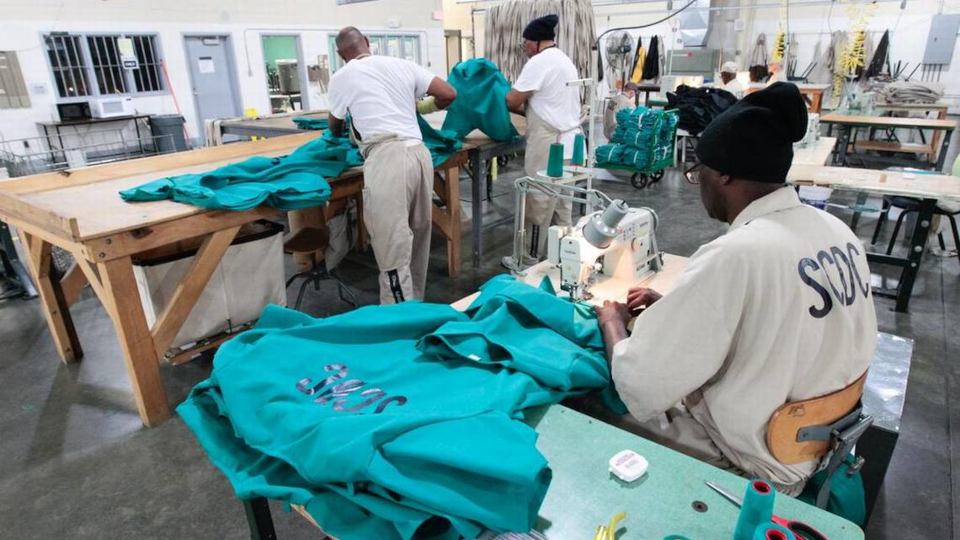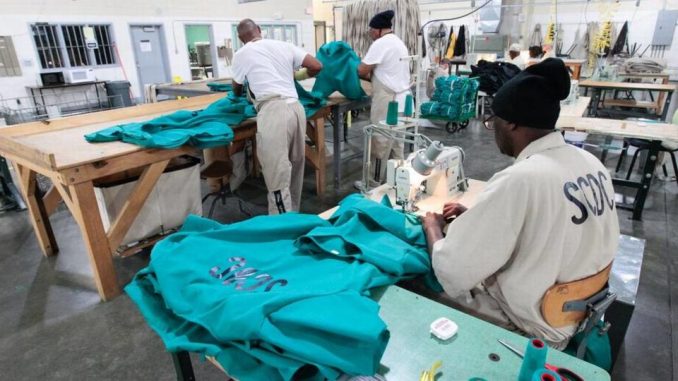

Prisoners at Lee Correctional make uniforms for all the inmates in the South Carolina state prison system.


Prisoners at Lee Correctional make uniforms for all the inmates in the South Carolina state prison system.
This is an excerpt from an interview conducted after an April 15 rebellion at Lee Correctional Institution, a South Carolina maximum security prison. Jared Ware spoke with individuals inside Lee, one of whom identified as a member of Jailhouse Lawyers Speak, a group of imprisoned human rights advocates who called for the National Prison Strike, Aug. 21 to Sept. 9.
Jared Ware: I want to give you an opportunity to talk about change. What changes would you like to see in the prison system? I know some of you are abolitionists, but what can be done for immediate needs in terms of reforms?
D: I’m always thinking about it as a dismantling process. I’ve been trying to push that for a while. We call it a dismantling process. And that gives the opportunity for other people to get in with their reform ideas, because I don’t think we can go from one angle all the way to the other angle, like from zero to a hundred. It’s just not going to happen like that. It is not going to play out like that.
Nonetheless, some of the things that I feel can actually improve: First and foremost, sentencing. Sentencing reform in the state of South Carolina. It’s not just sentencing reform in the state of South Carolina, it’s actually sentencing reform across the nation. They need to get rid of that Truth-In-Sentencing deal, period.
We need an end of dehumanizing conditions, and that means food improvement. We need open yards again, not just enclosed rec yards; we need these open rec yards again, where prisoners can move. We need prisoners to start being treated like humans. We need more rights to our visits. We need education programs. I’m a big one on education programs, in particular Pell Grants. … They need to be brought back to the prison systems again.
Not only that, but what the state of South Carolina did as the prison population fell — instead of closing down the maximum security prisons, they closed down the work releases. We need work releases opened back up and expanded.
Then we need one last thing: We need pay. We need prisoners to be able to be paid for their labor. If you’re doing general labor, you need to be able to be paid for that labor. … [That] comes [to] ending prison slavery.
We need to end prison slavery, which I think is a trigger toward abolitionist work. But nonetheless, we need to end prison slavery to bring back a lot of these prisoners getting paid wages. Those are immediate things that can be improved on.
As part of Workers World newspaper’s coverage marking the 50th anniversary of the liberation of…
From the PFLP Central Media Office The following statement from the Popular Front for the…
Newark, New Jersey Over 250 people, representing over 250 New Jersey endorsing community groups, attended…
Special to Workers World The following is a press release issued on April 24, 2025,…
dear Larry Krasner, we heard you sued Elon Musk over his corrupt million election giveaways…
Unions join forces against harassment and deportation of members When 200 immigrant workers – from…